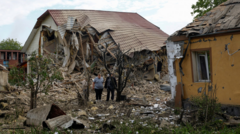Following a 7.7 magnitude earthquake that has claimed over 1,600 lives, Myanmar's military junta escalates air strikes in affected areas, drawing condemnation from international observers and human rights advocates who demand a halt to military operations during rescue efforts.
Myanmar’s Junta Escalates Air Strikes Amidst Earthquake Devastation

Myanmar’s Junta Escalates Air Strikes Amidst Earthquake Devastation
The military regime continues to bombard regions affected by the recent earthquake, causing global outrage and humanitarian concerns.
Myanmar's military junta has ramped up airstrikes across parts of the country, even as it deals with the aftermath of a catastrophic earthquake that has resulted in the deaths of more than 1,600 individuals. Reports indicate that bombings have occurred in Naung Lin Village, Shan state, with the UN branding these actions as "outrageous and unacceptable".
Special Rapporteur Tom Andrews expressed disbelief that military operations were ongoing amidst humanitarian crises, urging the junta to cease all military actions aimed at persecuting civilians in the wake of the historical disaster. "Anyone in a position to influence the military must make it clear that such behavior is intolerable," he stated.
Furthermore, pro-democracy armed factions have reported bombardments in Chang-U township, situated near the quake's epicenter, and along the border with Thailand. In response to the crisis, the National Unity Government, which represents the exiled civilian administration, announced a temporary halt to offensive military operations in quake-impacted areas, reserving the right for defensive maneuvers.
The earthquake, registering at 7.7 magnitude, rattled the Sagaing region and was perceptible as far away as Mandalay and Nay Pyi Taw. Rescue operations have faced significant obstacles, most notably the military's ongoing operations, with officials confirming many individuals remain trapped beneath the debris.
This earthquake has deepened the turmoil that has lingered over Myanmar since the military coup in 2021, which ignited widespread protests and an eventual civil war. The military has increasingly resorted to aerial bombardments as it loses ground to pro-democracy forces—a strategy that has proven lethal and destructive.
Despite the chaos, an investigation reveals the military now controls less than 25% of Myanmar, while armed resistance groups command approximately 42% of the territory. Unfortunately, these rebel factions lack aerial capabilities, leaving them vulnerable to the military’s air force.
The junta's long-standing practice of conducting indiscriminate air strikes has led to extensive damage and loss of life in civilian areas. As the UN warns of potential war crimes and human rights breaches committed by the junta, ongoing support from nations like China and Russia complicates the situation further, even as they provide humanitarian assistance.
Amidst the chaos, fears persist that the military may manipulate relief efforts to further its agenda, withholding aid from regions under the control of resistance factions. This strategy has been documented in previous humanitarian crises, with the military allegedly obstructing aid delivery to the most affected areas.
Overall, the juxtaposition of military aggression with humanitarian needs amidst a natural disaster creates a multifaceted crisis in Myanmar that calls for urgent international attention and intervention.




















